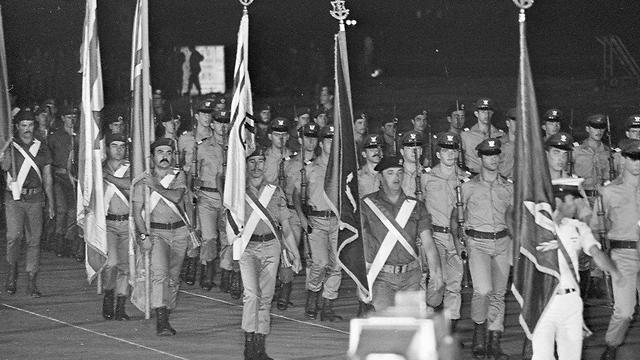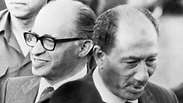

Hours after Sadat visit, IDF generals questioned Egypt's intentions
Released minutes of General Staff Forum meeting from November 22, 1977 reveal optimism following Egyptian president's historic visit, yet criticism against Begin and Sadat’s Knesset speeches; ‘Neither side showed any flexibility,’ says Northern Command chief Avigdor Ben-Gal, while IDF Chief of Staff Mordechai Gur talks about a notion to ‘prepare the war reserve stores unit for war.’
On November 22, 1977, at 9 am, several hours after Sadat flew back to Egypt, IDF generals discussed the visit in a meeting of the General Staff Forum.
Earlier this week, the IDF Archives in the Ministry of Defense released the minutes of that meeting, which had been defined as highly confidential. The head of the Military Intelligence Directorate at the time, Major-General Shlomo Gazit, said during the meeting: “When it comes to the intimate conversations, we know very little overall.”
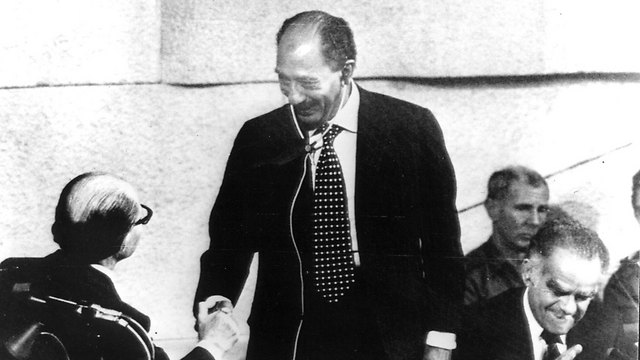
The chief of staff, Lieutenant-General Mordechai Gur, interrupted him and said: “This is about moves to prevent the war, of which I am unaware. But that was the issue, and that’s what (Prime Minister Menachem) Begin told people when he left the meeting.”
Maj.-Gen. Gazit continued, “Sadat’s goal was to come to Israel and tell all three elements, and the elements are both Israel and the global public opinion, and thirdly—and this was really the exception and, I would say, Sadat’s courage—the public opinion in the Arab world. And he came here and said, ‘Gentlemen, when I talk to you about peace, I am not laughing. When I talk to you about peace, I sincerely mean it. We are planning to enter conditions of peace with you, all this will be raised, and there will be coexistence. Israel will become a state with a recognized right to exist in the Arab world.”
The MI chief also addressed the Egyptian response to Sadat’s speech. Cairo was very impressed by the warm reception the president received in Israel, he noted.
“In Egypt there is a response, I would say, and full support for Sadat and for the move he made. Following Sadat’s speech, there is a feeling that Sadat properly presented the entire Arab case, and not just the Egyptian case. He spoke as if on behalf of all Arabs, of the justified claims of all Arabs.”
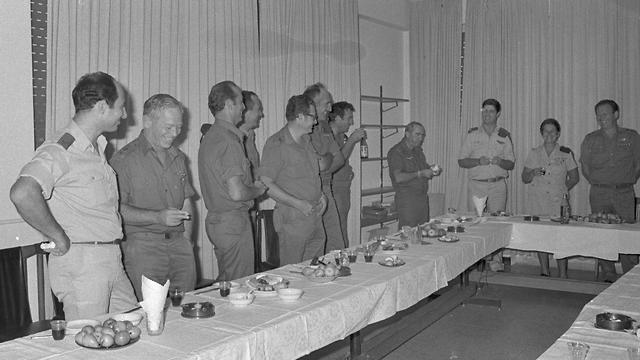
Prime Minister Menachem Begin’s speech, on the other hand, was actually received with disappointment in Cairo. “A tough speech, with no concessions, neither in terms of withdrawal nor on the Palestinian issue,” Maj.-Gen. Gazit said, “and Sadat’s major step was met with no Israeli return or regard.”
Southern Command chief Herzl Shafir gave the generals a long briefing on the Knesset speech. He elaborated on the points raised by Sadat and concluded: “‘Ending the existing state of war in the region.’ No other wording of peace, etc., but ending the state of war.”
Maj.-Gen. Moshe Levi, who served as Central Command chief at the time, noted: “He doesn’t say a single word about peace.”
Northern Command chief Avigdor Ben-Gal said, “’The peace agreement doesn’t include peace.” Later, he added: “He didn’t talk about war.”
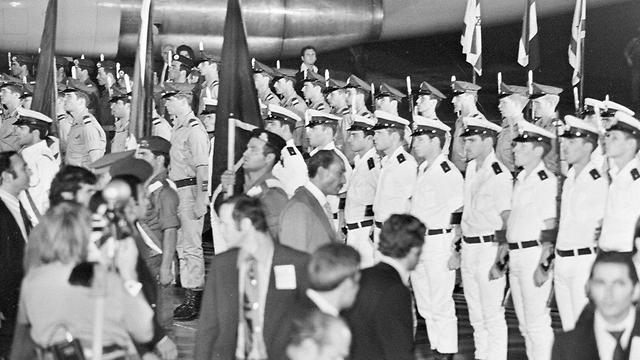
Later in the meeting, Chief of Staff Gur said the Egyptians “expressed a lot of dissatisfaction with Begin’s speech.” The army chief shattered the euphoria of peace in the room by saying: “At the end of yesterday’s speech, at the end of the speeches, if I have to point to the operative order that the chief of staff received both from the Defense Ministry and from members of the Ministerial Committee for Security, and from many of the Knesset members as well, it is ‘prepare the war reserve stores unit for war.’”
Addressing Begin and Sadat’s Knesset speeches, Maj.-Gen. Ben-Gal said: “There was a dialogue of the deaf at the Knesset. Each speech was a traditional speech, and at the end of the day, neither side showed any flexibility. The only flexible move so far wasn’t in a speech, but in the actual arrival of an Egyptian president in the Land of Israel to address the Knesset, which is a breakthrough.”
He went on to attack Begin. “The State of Israel, through the prime minister’s speech, demonstrated a misunderstanding and inflexibility and, I would say, failed to understand the great opportunity it had been given with the Egyptian president’s arrival in the Land of Israel. And I think that the speech, the way it was delivered in public, was a serious mistake, as it contained no change in the traditional stances and there wasn’t even the slightest attempt to offer something for a productive continuation of the process.”
‘The first thing he looks for is Arik Sharon’
In another meeting, held a week later, then-Defense Minister Ezer Weizman addressed Sadat’s visit and Egypt's military ability. “He feels a bit ‘screwed.’ Absolutely. It’s no coincidence that the first thing he looks for is Arik (Ariel Sharon, who had been hailed as a war hero for crossing the Suez Canal). Arik, because it’s a wart. He tells him twice, ‘Next time I will catch you,’ and they speak less. On the one hand, he isn’t happy with his military situation. On the other hand, he doesn’t want to lose what he’s achieved.
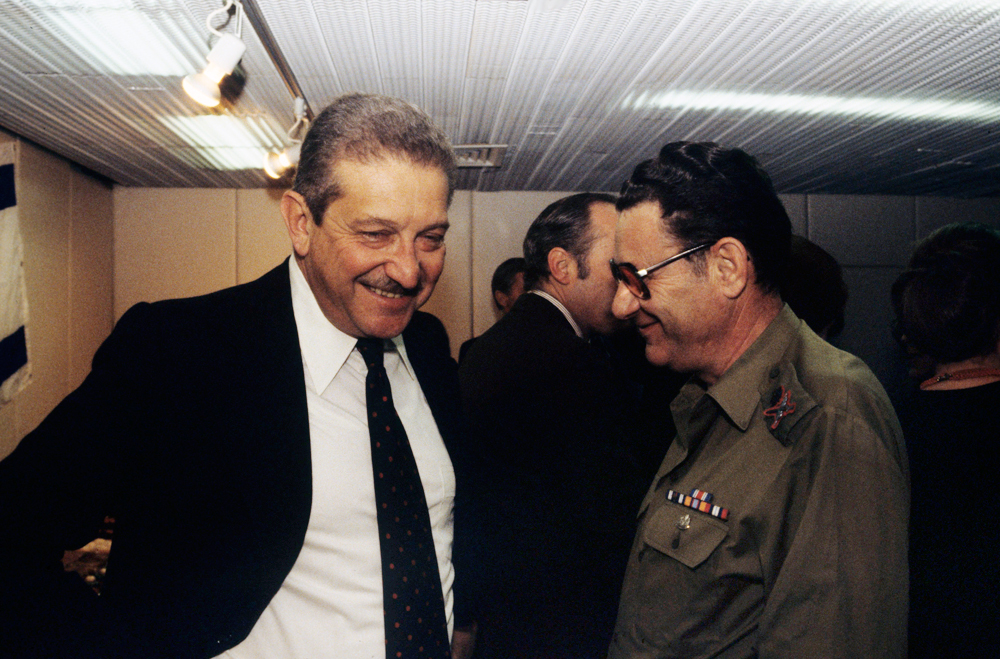
“He succeeded in opening the canal, he gained hold of the eastern bank of Sinai. I don’t know if you remember, a million Egyptians went back to live along the canal. Someone who returns a million Egyptian to live along the canal won’t run back into a war so fast. I’m saying it again, whoever launched the war in ‘73 can launched a war again, but this is more or less the state of mind at the moment.”
Minister Weizman also spoke about the Palestinian issue, which was raised in Sadat’s speech and in the General Staff Forum a week earlier.
“The key issue, and I have no doubt it will remain the key issue, is the Palestinian issue. If they could solve the Palestinian issue today, he’s not interested. I can tell you that face-to-face, he says different things. It’s no coincidence that he mentioned the PLO in his speech. And I don’t know if you noticed, in his Cairo speech he also said, ‘I saw the fighters in the jails, not those sitting in cafés in Beirut.’”
Maj.-Gen. Gazit noted that he had talked about nightclubs in the Lebanese capital, not cafés. ‘Which means there is a certain contempt towards this issue,” Weizman concluded.














